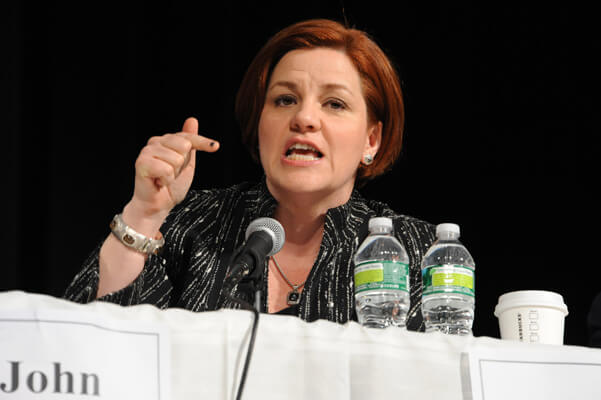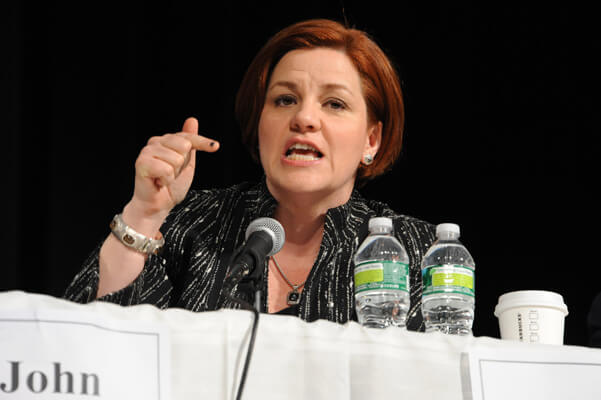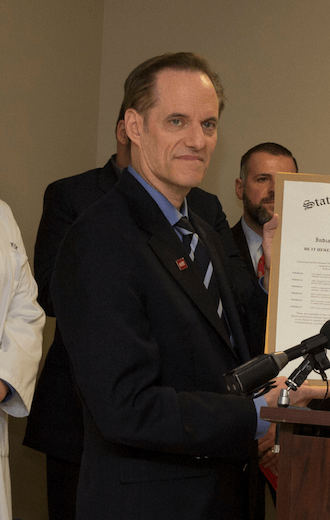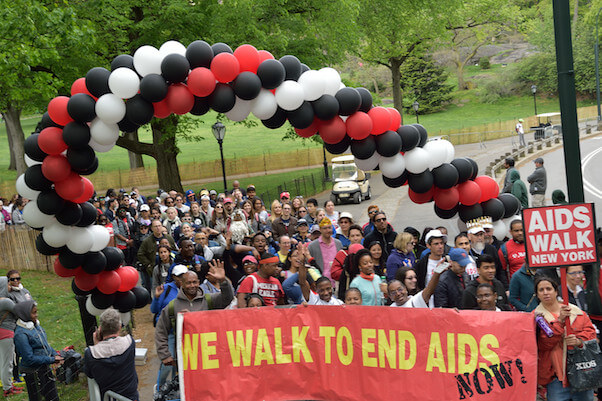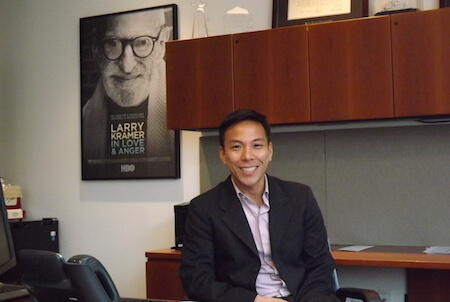Speaking at a World AIDS Day event, Mayor Bill de Blasio endorsed HASA For All, city legislation that would expand eligibility for rental assistance, food stamps, and other benefits for people with HIV.
“We believe that no New Yorker with HIV should have to choose between medication and food or medication and rent,” the mayor told the crowd that packed the Apollo Theater in Harlem for the December 1 event.
Currently, the HIV/ AIDS Services Administration (HASA), which is a unit of the city’s Human Resources Administration (HRA), only provides benefits to city residents who have symptomatic HIV illness or an AIDS diagnosis. With the advent of powerful anti-HIV drugs, it has become increasingly rare for a person with HIV to progress to symptomatic illness or an AIDS diagnoses. This has meant that poor people who are HIV-positive do not qualify for HASA and it has led to some people with HIV skipping treatment until they are sick enough to qualify for HASA assistance, advocates say.
The mayor said a change was required.
“How about we try something different, how about HASA For All?,” he said to loud and sustained applause from the crowd.
AIDS groups have sought HASA For All since 2007, when it was first introduced in the City Council. Seen as too expensive and just another government entitlement, it was opposed by Mayor Michael Bloomberg and then-City Council Speaker Christine Quinn, an out lesbian who represented Chelsea. The legislation was reintroduced this year by Corey Johnson, the openly gay and HIV-positive City Council member who represents what was Quinn‘s district. The bill has 36 co-sponsors in the 51-member Council, up from seven at the start of the year.
The mayor’s endorsement was expected. The City Council has been discussing the legislation since the start of the year. Dan Tietz, HRA’s chief special services officer, endorsed the legislation at an October 14 City Council hearing, a move that was most likely endorsed by the de Blasio administration.
City Hall and the Cuomo administration are still negotiating the city/ state split to fund the expanded benefits. It is anticipated that the expansion will cost $99 million a year after it is fully implemented on July 1, 2017, the start of the city’s fiscal year. HASA currently serves roughly 32,000 people with AIDS and another 10,700 of their family members. HASA For All would add an estimated 7,300 new clients by 2020.
AIDS groups have argued that stable housing, nutrition, and other benefits help people with HIV stay on their medication, which means they are healthy and more likely to reduce the amount of virus in their bodies, making them less infectious to the point that they cannot infect others.
HASA For All achieves a goal sought in the Plan to End AIDS, which aims to reduce new HIV infections from the current roughly 3,000 a year in the state to 750 annually by 2020. Over 90 percent of new HIV infections in New York are in the city. The plan relies on treating HIV-positive people so they are no longer infectious and giving anti-HIV drugs to HIV-negative people to keep them uninfected. Both strategies are highly effective when used correctly.
The mayor also announced that the city would dedicate more than $23 million a year going forward to fund various strategies that are part of the Plan to End AIDS. Ten million dollars will fund getting newly-diagnosed, HIV-positive people into treatment and $5 million will support efforts to keep HIV-positive people in treatment. Six million dollars will pay for pre-exposure prophylaxis (PrEP) and post-exposure prophylaxis (PEP), which use anti-HIV drugs in HIV-negative people to keep them uninfected. The remaining cash will fund public education campaigns.
In an apparent effort to overshadow the mayor, the Cuomo administration told the New York Times on November 29 that the number of Medicaid beneficiaries in the state on PrEP had climbed to nearly 1,700 as of September from roughly 300 in 2014. The next day, the Cuomo administration announced in the Daily News that it would propose $200 million in new spending for the Plan to End AIDS in the next state budget. The state contributed $10 million to the plan in the current fiscal year, which began on April 1.
Governor Andrew Cuomo, a Democrat, has sought to diminish the power and profile of other Democrats in the state, including State Comptroller Thomas DiNapoli and State Attorney General Eric Schneiderman. His attacks on de Blasio have been particularly pointed.
“I’m very proud to say that the first state and the first governor to respond with an action plan was the state of New York and Governor Mario Cuomo,” Cuomo told the crowd at the Apollo, referring to his father’s response to the AIDS epidemic.
Cuomo, who spoke an hour before de Blasio, never named the mayor even as he saluted a number of elected officials at the event. In his speech, the mayor referred to “the state” whenever he discussed funding or initiatives coming from Albany.

